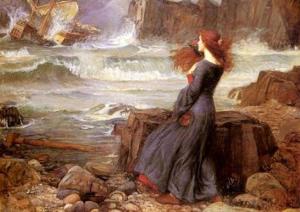| Author: | Alice Birkhead | ISBN: | 9781465512444 |
| Publisher: | Library of Alexandria | Publication: | March 8, 2015 |
| Imprint: | Language: | English |
| Author: | Alice Birkhead |
| ISBN: | 9781465512444 |
| Publisher: | Library of Alexandria |
| Publication: | March 8, 2015 |
| Imprint: | |
| Language: | English |
The Two Swords In the fourth century after Christ began that decay of the Roman Empire which had been the pride of the then civilized world. Warriors of Teutonic race invaded its splendid cities, destroyed without remorse the costliest and most beautiful of its antique treasures. Temples and images of the gods fell before barbarians whose only fear was lest they should die "upon the straw," while marble fountains and luxurious bath-houses were despoiled as signs of a most inglorious state of civilization. Theatres perished and, with them, the plays of Greek dramatists, who have found no true successors. Pictures and statues and buildings were defaced where they were not utterly destroyed. The Latin race survived, forlornly conscious of its vanished culture. The Teutons had hardly begun to impose upon the Empire the rude customs of their own race when Saracens, bent upon spreading the religion of Mahomet, bore down upon Italy, where resistance from watchtowers and castles was powerless to check their cruel depredations. Norman pirates plundered the shores of the Mediterranean and sailed up the River Seine, always winning easy victories. Magyars, a strange, wandering race, came from the East and wrought much evil among the newly-settled Germans. From the third to the tenth century there were incredible changes among the European nations. Gone were the gleaming cities of the South and the worship of art and science and the exquisite refinements of the life of scholarly leisure. Gone were the flourishing manufactures since the warrior had no time to devote to trading. Gone was the love of letters and the philosopher's prestige now that men looked to the battle-field alone to give them the awards of glory. Outwardly, Europe of the Middle Ages presented a sad contrast to the magnificence of an Empire which was fading to remoteness year by year. The ugly towns did not attempt to hide their squalor, when dirt was such a natural condition of life that a knight would dwell boastfully upon his contempt for cleanliness, and a beauty display hands innocent of all proper tending. The dress of the people was ill-made and scanty, lacking the severe grace of the Roman toga. Furniture was rudely hewn from wood and placed on floors which were generally uneven and covered with straw instead of being paved with tessellated marble
The Two Swords In the fourth century after Christ began that decay of the Roman Empire which had been the pride of the then civilized world. Warriors of Teutonic race invaded its splendid cities, destroyed without remorse the costliest and most beautiful of its antique treasures. Temples and images of the gods fell before barbarians whose only fear was lest they should die "upon the straw," while marble fountains and luxurious bath-houses were despoiled as signs of a most inglorious state of civilization. Theatres perished and, with them, the plays of Greek dramatists, who have found no true successors. Pictures and statues and buildings were defaced where they were not utterly destroyed. The Latin race survived, forlornly conscious of its vanished culture. The Teutons had hardly begun to impose upon the Empire the rude customs of their own race when Saracens, bent upon spreading the religion of Mahomet, bore down upon Italy, where resistance from watchtowers and castles was powerless to check their cruel depredations. Norman pirates plundered the shores of the Mediterranean and sailed up the River Seine, always winning easy victories. Magyars, a strange, wandering race, came from the East and wrought much evil among the newly-settled Germans. From the third to the tenth century there were incredible changes among the European nations. Gone were the gleaming cities of the South and the worship of art and science and the exquisite refinements of the life of scholarly leisure. Gone were the flourishing manufactures since the warrior had no time to devote to trading. Gone was the love of letters and the philosopher's prestige now that men looked to the battle-field alone to give them the awards of glory. Outwardly, Europe of the Middle Ages presented a sad contrast to the magnificence of an Empire which was fading to remoteness year by year. The ugly towns did not attempt to hide their squalor, when dirt was such a natural condition of life that a knight would dwell boastfully upon his contempt for cleanliness, and a beauty display hands innocent of all proper tending. The dress of the people was ill-made and scanty, lacking the severe grace of the Roman toga. Furniture was rudely hewn from wood and placed on floors which were generally uneven and covered with straw instead of being paved with tessellated marble















